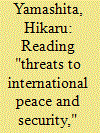| Srl | Item |
| 1 |
ID:
061773


|
|
|
|
|
| Publication |
Apr 2005.
|
| Summary/Abstract |
This article aims to articulate how humanitarian action and counter-terrorism could be influencing the current shape of international relations through an examination of recent discourses on terrorism and internal displacement. These discourses have produced two corresponding approaches to state sovereignty that share the need to view sovereignty as measured in terms of the degree to which a state discharges its ‘sovereign responsibilities’ and yet that propose conflicting prescriptions for action against states deemed to fail in exercising such requirements. As internal sovereignty increasingly becomes challengeable by external sovereignty, this article concludes by suggesting how the two approaches can be synthesised in a fruitful manner.
1 The views expressed in this article are strictly personal. The author would like to thank three anonymous referees at the Cambridge Review of International Affairs for their comments on the draft.
|
|
|
|
|
|
|
|
|
|
|
|
|
|
|
|
| 2 |
ID:
084576


|
|
|
|
|
| Publication |
2008.
|
| Summary/Abstract |
This article explains how the idea of 'impartial' use of force by peacekeepers, first proposed in the Brahimi Report of 2000, has been translated into practice. It first links the report's definition of impartiality to mandates of post-Brahimi operations to identify what impartiality has come to mean in peacekeeping mandates. It argues specifically that impartiality has encompassed two different components of robust mandate implementation and humanitarian protection and that the former has been prioritized over the latter. It then evaluates these two components in the light of peacekeeping experiences in Sierra Leone and Haiti.
|
|
|
|
|
|
|
|
|
|
|
|
|
|
|
|
| 3 |
ID:
141196


|
|
|
|
|
| Summary/Abstract |
This article seeks to place new/neo humanitarianism in a wider context of post-Cold War international relations and argues that its emergence corresponds to an important shift in the meaning of the political in contemporary international relations. It describes the shift in terms of the contrast between two logics of politics: the conventional logic of distinction, whereby political processes take place between territorially separated sovereign entities, and the emerging logic of translucency. The latter logic, in which new values (and risks) are generated by the actor’s ability and will to extend beyond its material and ideational boundaries, has been adopted by many global actors, including humanitarian ones. The article argues that new humanitarianism, which seeks linkage to activities that were once off limits to traditional humanitarianism, represents another example of the practical and ideational adaptation on the part of a traditional movement to a new political landscape.
|
|
|
|
|
|
|
|
|
|
|
|
|
|
|
|
| 4 |
ID:
122601


|
|
|
|
|
| Publication |
2012.
|
| Summary/Abstract |
Since the adoption of an action plan at the Sea Island Summit in 2004, the Group of Eight (G8) has
addressed the issue of global peacekeeping capacity-building. This peacekeeping capacity-building
assistance agenda includes military, police and civilian aspects of peacekeeping, and aims at the
development of a comprehensive range of peacekeeping capabilities worldwide. The G8 initiatives
have produced some positive results for those nations receiving assistance. However, on the other
hand, the G8 members' actual assistance programs have placed an emphasis on the training of military
peacekeepers at the cost of some other areas, including logistic and financial assistance, which have
not received sufficient attention.
Unlike the United Nations (UN), the G8 is not an operational actor in peacekeeping. However,
from a diplomatic perspective, the G8, like the UN, is a global actor while being unique in that it has
a more flexible organizational structure and agenda-setting capacity. The G8 can play a significant
role in global peacekeeping by mobilizing and legitimizing international assistance to global actors
and governments engaged in peacekeeping as well as peacekeeping capacity-building. As a founding
member of the G8, Japan is expected to actively draw linkages with the G8's peacekeeping capacitybuilding agenda with its own peacekeeping policy and to take the initiative in further developing the
G8 agenda.
|
|
|
|
|
|
|
|
|
|
|
|
|
|
|
|
| 5 |
ID:
117839


|
|
|
|
|
| Publication |
2012.
|
| Summary/Abstract |
This article considers a conceptual framework for peacekeeping cooperation between the United Nations and regional organisations. It articulates the 'subcontracting' and 'partnering' modes of global-regional peacekeeping cooperation, and examines how they have been practiced through efforts to form institutional partnerships with the African Union (AU) and the European Union (EU). The article argues that there is incremental progress in institutionalising global-regional cooperation in peacekeeping, and yet managing such cooperation in the future requires a clearer understanding of the role of the UN in the globalisation of peacekeeping.
|
|
|
|
|
|
|
|
|
|
|
|
|
|
|
|
| 6 |
ID:
079875


|
|
|
|
|
| Publication |
2007.
|
| Summary/Abstract |
In the United Nations Charter the notion of the "threat to international peace and security" is designed to play a key enabling role in framing its collective security functions. Taking a 60-year period from the UN's founding, this article examines how the UN Security Council has developed the notion of the "threat to international peace and security" through its resolutions, and what this evolution might mean for the notion of collective security and the Council's role in it.
|
|
|
|
|
|
|
|
|
|
|
|
|
|
|
|